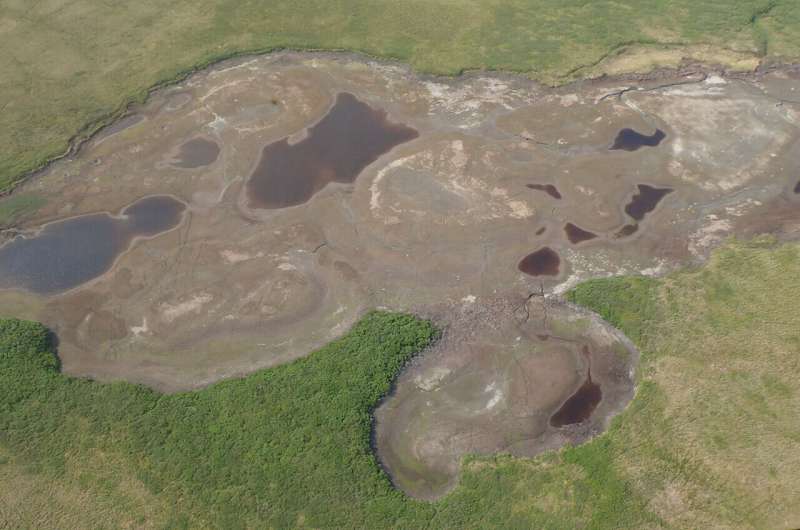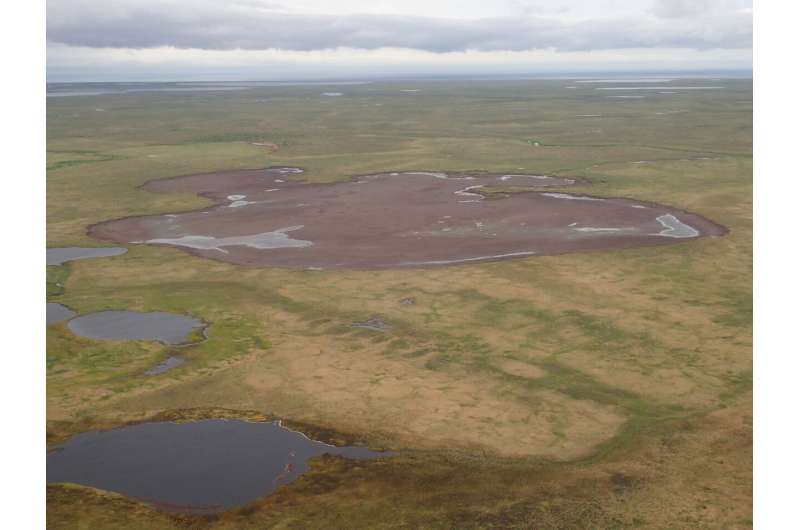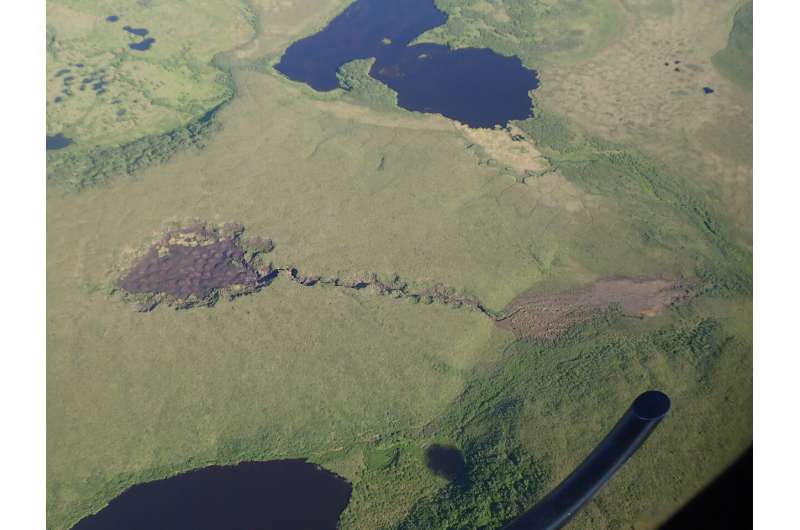
The Arctic is no stranger to loss. As the region warms nearly four times faster than the rest of the world, glaciers collapse, wildlife suffers and habitats continue to disappear at a record pace.
Now, a new threat has become apparent: Arctic lakes are drying up, according to research published in the journal Nature Climate Change. The study, led by University of Florida Department of Biology postdoctoral researcher Elizabeth Webb, flashes a new warning light on the global climate dashboard.
Webb's research reveals that over the past 20 years, Arctic lakes have shrunk or dried completely across the pan-Arctic, a region spanning the northern parts of Canada, Russia, Greenland, Scandinavia and Alaska. The findings offer clues about why the mass drying is happening and how the loss can be slowed.
The vanishing lakes act as cornerstones of the Arctic ecosystem. They provide a critical source of fresh water for local Indigenous communities and industries. Threatened and endangered species, including migratory birds and aquatic creatures, also rely on the lake habitats for survival.
The lake decline comes as a surprise. Scientists had predicted that climate change would initially expand lakes across the tundra, due to land surface changes resulting from melting ground ice, with eventual drying in the mid-21st or 22nd century. Instead, it appears that thawing permafrost, the frozen soil that blankets the Arctic, may drain lakes and outweigh this expansion effect, says Webb. The team theorized that thawing permafrost may decrease lake area by creating drainage channels and increasing soil erosion into the lakes.
"Our findings suggest that permafrost thaw is occurring even faster than we as a community had anticipated," Webb said. "It also indicates that the region is likely on a trajectory toward more landscape-scale drainage in the future."

In addition to rising temperatures, the study also revealed that increases in autumn rainfall cause permafrost degradation and lake drainage. "It might seem counterintuitive that increasing rainfall reduces surface water," said Jeremy Lichstein, Webb's advisor and a co-author of the study. "But it turns out the physical explanation was already in the scientific literature: rainwater carries heat into the soil and accelerates permafrost thaw, which can open up underground channels that drain the surface."
If accelerated permafrost thaw is to blame, that's unwelcome news. The Arctic permafrost is a natural warehouse of preserved organic matter and planet-warming gases.
"Permafrost soils store nearly two times as much carbon as the atmosphere," Webb said. "There's a lot of ongoing research suggesting that as permafrost thaws, this carbon is vulnerable to being released to the atmosphere in the form of methane and carbon dioxide."
There is a silver lining in the researcher's findings. Previous models of lake dynamics predicted lake expansion, which thaws the surrounding permafrost. But because lakes are drying, permafrost near the lakes is likely not thawing as fast.
"It's not immediately clear exactly what the trade-offs are, but we do know that lake expansion causes carbon losses orders of magnitude higher than occurs in surrounding regions," Webb said.
To achieve their results, Webb's team used satellite data to identify broad trends in surface water change across the Arctic. Known as remote sensing, satellite imagery helps answer broad-scale questions, says Webb.

"One of the things that I really like about using remote sensing is that you can answer what seemed like impossibly big questions—we have the ability to answer them now," Webb said. "It's only in the past five, 10 years that we've had the computing power and resources to pull this off."
The research team used a machine-learning approach to examine the climate change mechanisms responsible for lake area change. By harnessing large ensembles of satellite images to assess patterns of surface water loss, they were able to analyze decades of data across the Arctic. Their work relied on robust programs, including Google Earth Engine and the Python platform on UF's HiPerGator supercomputer, to query large data sets and run models.
Webb initially set out to explore a different topic altogether: Arctic albedo, or surface reflectivity. Webb's earlier work in Environmental Research Letters showed that surface water is an important driver of albedo change, but she struggled to locate studies that detailed why the surface waters were changing in the first place. "I wrote the paper I wanted to cite for my albedo work," she said.
To curtail the lakes' demise, recent research in Frontiers in Environmental Science shows that perhaps the best way to save permafrost is by cutting fossil fuel emissions. Reducing carbon emissions could put the planet back on track by limiting global temperature rise.
"The snowball is already rolling," Webb said, stating that we need to act now to slow these changes. "It's not going to work to keep on doing what we're doing."
E E Webb et al, Surface water, vegetation, and fire as drivers of the terrestrial Arctic-boreal albedo feedback, Environmental Research Letters (2021). DOI: 10.1088/1748-9326/ac14ea
Benjamin W. Abbott et al, We Must Stop Fossil Fuel Emissions to Protect Permafrost Ecosystems, Frontiers in Environmental Science (2022). DOI: 10.3389/fenvs.2022.889428
Permafrost Discovery Gateway: arcticdata.io/catalog/portals/ … frost/Imagery-Viewer
Citation: Arctic lakes are vanishing in surprise climate finding (2022, August 30) retrieved 31 August 2022 from https://ift.tt/N0v4kIJ
This document is subject to copyright. Apart from any fair dealing for the purpose of private study or research, no part may be reproduced without the written permission. The content is provided for information purposes only.
Science - Latest - Google News
August 30, 2022 at 10:23PM
https://ift.tt/zjebou5
Arctic lakes are vanishing in surprise climate finding - Phys.org
Science - Latest - Google News
https://ift.tt/VYnX3yJ
https://ift.tt/fTZmEQg
Bagikan Berita Ini

















0 Response to "Arctic lakes are vanishing in surprise climate finding - Phys.org"
Post a Comment